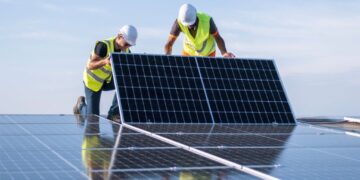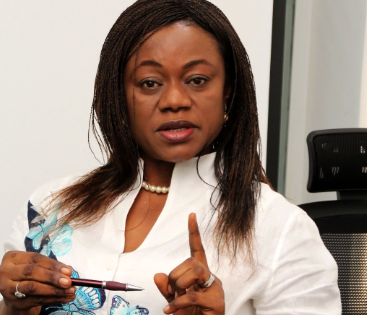The General Manager ,West Africa, Azuri Technologies Ltd, Mrs. Vera Nwanze is a focused, dynamic, passionate team leader with “Can Do” attitude. In this interview with AYOBAMI ADEDINNI , she reveals how the company has become a household name through its dynamic PayGo system, financing challenges among other issues.
Excerpts :
What can you say about the Nigerian alternative energy industry?
The renewable energy industry is a game changer. This is because over 50 per cent of our population do not have access to electricity. Even those on the grid, some of them have not had electricity for the past 10 years and a lot are still not on the grid.
And we know that the cost of piping and putting those off the grid onto the grid is not affordable. So the question now is, how do we bridge the gap?
This is where renewable energy now comes in. it is affordable especially now that the technology is improving, it is clean and dependable
On the issue of sustainability, critics have said a major disadvantage of renewable energy is that it is not reliable…
For the solar home system which is a sector that we are playing in, we already know that it depends on the sun. Do you know that when it is dark, there is still some level of sun especially in the African region where we have some significant sunshine all year?
Coming to the intensity of the sun now, this is where Azuri products are exceptional. We have a special intelligence in the system which allows the system to recognize the usage pattern of the solar system by the individual.
How do I mean? A customer acquires a system on the first of February and starts using it every day. He comes back from work, he turns it on from 8 pm to 5 am every day.
After about 15 days, the system already knows that he uses it for a specific number of hours per day
So in the days of less sunlight or when the system is unable to be 100 per cent charged, the system is intelligent enough to give him that same number of hours of lighting but deepens the intensity of the bulb without the customer realizing that the bulb has been dimmed from the usual brightness that you normally have.
This has gained us several awards in the USA. This is what brings about the difference. The thing is provided the panel is positioned at an appropriate angle, the maximum sunlight will be gotten from the sun.
Recently, the Managing Director of a solar company said local banks are not that committed to funding the sector. What’s your take on that?
I quite agree with that because the solar sector in Nigeria is still not well adopted because people are still sceptical on whether it is working or not. Permit me to also say that in the earlier days when the solar system came in, the other countries were patronized for cheap products because they will reduce the quality and this led to a lot of people losing trust in the solar product.
The narrative is changing fast with dependable sources like ours. Our technology is a spinoff of the Cambridge technology and we make the prototype in the UK and we produce from Malaysia.
Coming back to financing, even the banks that are supposedly supporting solar products talk about it but do not act it.
In East Africa, where the solar system is well established, you see a lot of the banks partaking. In Nigeria, we have adopted a watch and see attitude. We only go with the fine bride.
We have approached a lot of Nigerian banks, but they are not wiling because they still don’t understand the sector very well to be able to partake. So, their appetite for risk is zero.
On the PayGo area where we also play, where is the collateral going to come from?
This is why you see us discussing some special purpose vehicles financing structure whereby we use the receivable as collateral. We sign a contract with customer over a period of years where they pay on monthly basis because we know that these are the people at the bottom of the pyramid and the financial capacity is not there.
So, we have to ensure that these people enjoy the services while also being able to pay at a convenient and affordable rate.
This is why we have in place a good system of customer management monitoring the credit pattern of customers, calling and reminding them of their debts in case they default and following them up through what is called the last mile distribution network in achieving this.
Could you talk more on the last mile distribution network?
Because these people are not financially included, they have just “I better pass my neighbor phone”, they don’t have bank accounts nor mobile money services, what we do is in those areas where we have already deployed the system, we get agents, have a town hall meeting, partner with the community head and from there, we ask him to recommend those that can be our agents.
These agents on monthly basis go to places where the systems have been installed and collect the payments from them and then take it to the bank to pay. Above all these agents also earn additional income by doing this because they get commission from whatever they collect which is also empowering the people by providing job opportunities and making them more productive.
How challenging has that been taking into cognizance the unwillingness of some customers to pay?
We have covered 12 states in the northern part of the country for now although we are scaling that up to go to the South. As we speak, we have deployed over 18,000 units to these states in the North through our partnership with our local distributor and we also partner with Niger Delta Power Holding Company, (NDPHC) using our local distributor to achieve this .
We are in Taraba, Borno, Plateau, Katsina, Zamfara, Jigawa among others.
You mentioned Borno, how is that possible due to insurgency?
The fact is that is where the Internally Displaced People, (IDPs) are. We are mindful of maximizing social impact. Whatever you are doing in the country now which seems not be impacting the IDPs cannot be said to be inclusive of all and that is why we have also considered to deploy in Borno.
We started July, 2017 and before the end of March, we should be able to have increased it to 20,000 units.
What do these 18,000 units translate to?
We all know there is a discrepancy in the average number of people which is usually 5 per household. But we know that there are more than that in the North. So, if we multiply 8 by 20,000 that gives about 160,000 people that have been directly impacted. Indirectly, there are agents, installers and others that contribute within the chain and therefore the benefits are far-reaching.
How much has Azuri invested in the country?
Azuri has a long term plan in the country. The 20,000 units is actually a partnership between NDPHC and our local distributor. It is a government initiative.
But globally, Azuri is present in 12 African countries. So, this solution is actually dedicated to Africans.
We have just finished a fundraising of $20 million and we are still discussing with more investors. In Nigeria, we just got the DFID plan to run a pilot study.
Your products are targeted at the rural area, is there any plan to come to the city?
We believe the city people have light. They have the affluence of life. They have bigger homes, bigger generators, inverters among others. They are not our target.
Our product is smaller grade capacity. We have two products that we run in the counties that we are in.
One is the Quad which is a lighting system only. It comes with four lighting bulbs, a control unit, panel which is put on the roof and a charging port for the phone and radio.
It is something that can be connected in a 3 bedroom bungalow.
The second product is the TV which has all the features of the Quad but comes with a TV, 50 watt panel and higher intensity.
How supportive has the Nigerian Electricity Regulatory Commission, (NERC) been?
The Nigerian Government just created the Renewable Energy Agency,(REA). Some of the regulations are not right. The right regulatory environment has to be created. How do I mean?
If we have some tax waivers for the panel products, that will also go a long way in making these products more affordable because the end users will bear the cost.
What obtains today is that they separate the panel and say others are electronic but how would they run without the panel?
So, they should be seen a single entity when it comes to VAT.
Also, a fair playing ground should be provided for all players in the sector i.e. deal with Mr A the way you deal with Mr B. when the right thing is done, it will be a better place for us all























